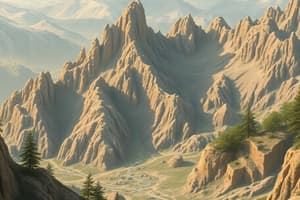Podcast
Questions and Answers
What is the main focus of climatology?
What is the main focus of climatology?
- Short-term weather patterns
- Global ocean currents
- Volcanic eruptions
- Long-term patterns and trends in the earth's atmosphere (correct)
How do mountain ranges influence ecosystems?
How do mountain ranges influence ecosystems?
- By causing hurricanes
- By decreasing global temperatures
- By creating desert conditions
- By creating unique microclimates (correct)
What human activities significantly contribute to greenhouse gas emissions according to research in climatology?
What human activities significantly contribute to greenhouse gas emissions according to research in climatology?
- Planting trees
- Using renewable energy sources
- Burning fossil fuels and deforestation (correct)
- Recycling plastics
Why is understanding atmospheric processes important for climate modeling?
Why is understanding atmospheric processes important for climate modeling?
In what way do oceans influence global temperatures?
In what way do oceans influence global temperatures?
What does physical geography primarily focus on?
What does physical geography primarily focus on?
Which of the following is NOT typically studied in physical geography?
Which of the following is NOT typically studied in physical geography?
What type of information can geologists derive from studying geologic processes?
What type of information can geologists derive from studying geologic processes?
How do landforms and bodies of water contribute to physical geography?
How do landforms and bodies of water contribute to physical geography?
Why is studying the movement of tectonic plates important in physical geography?
Why is studying the movement of tectonic plates important in physical geography?
Flashcards are hidden until you start studying
Study Notes
Geography: Physical and Climatological Perspectives
Geography is a multidisciplinary field that involves the study of various aspects of Earth, its inhabitants, and the relationship between them. Two key subfields within this broad domain are physical geography and climatology, each shedding light on distinct yet interconnected facets of our planet and the processes shaping it.
Physical Geography
Physical geography focuses on the earth's physical features, how they are distributed, and how these distributions affect living organisms. It covers diverse topics such as plate tectonics, topography, landforms, bodies of water, soil types, vegetation coverage, and atmospheric phenomena. Understanding the physical properties of our planet provides crucial context for studying the ways humans interact with the environment and adapt to changing conditions over time.
Geologic Processes
The study of geologic processes delves into the internal structure and composition of Earth. By examining the movement of tectonic plates, volcanic activity, erosion rates, and seismicity patterns, geographers can make informed predictions about future events and identify potential hazards for communities. For example, detailed knowledge of earthquakes, tsunamis, and volcanic eruptions has helped countries develop early warning systems and disaster preparedness plans.
Landforms and Bodies of Water
Landforms and bodies of water play a significant role in shaping physical geography. From towering mountains like the Himalayas to vast oceans such as the Atlantic, these features influence the distribution of life on Earth. For instance, mountain ranges create unique microclimates and ecosystems due to their elevated locations, while oceans regulate global temperatures and atmospheric circulation patterns.
Climatology
Climatology is the branch of meteorology that studies long-term patterns and trends in the earth's atmosphere, particularly those related to weather and temperature. It involves analyzing data on precipitation, temperature, wind, and atmospheric pressure to understand how these factors interact and influence one another. Climatology also plays a critical role in predicting future climate change and its potential impacts on ecosystems and human societies.
Atmospheric Processes
Understanding atmospheric processes is essential for climate modeling and forecasting. This includes studying the movement of air masses, the formation of weather systems, and the interactions between Earth's surface and the atmosphere. By monitoring changes in these processes, scientists can identify trends and predict future climate scenarios.
Climate Change
Climate change is a pressing issue that affects every corner of our planet. As global temperatures continue to rise, scientists are working to understand the causes and consequences of this phenomenon. Research in climatology has revealed that human activities, such as the burning of fossil fuels and deforestation, contribute significantly to greenhouse gas emissions and the acceleration of global warming. Understanding these connections is crucial for developing strategies to mitigate and adapt to the impacts of climate change.
In summary, physical geography and climatology are intertwined disciplines that together provide a comprehensive understanding of Earth's natural systems and the forces shaping them. By studying these fields, we can gain valuable insights into the complex relationships between our planet's physical features, atmospheric processes, and the diverse lifeforms that inhabit it.
Studying That Suits You
Use AI to generate personalized quizzes and flashcards to suit your learning preferences.




